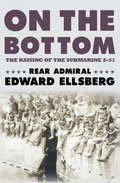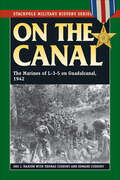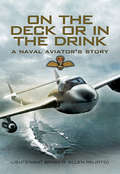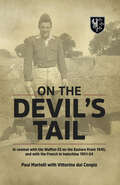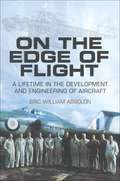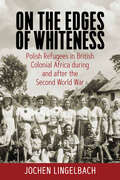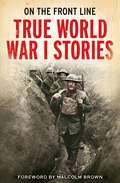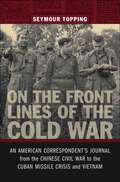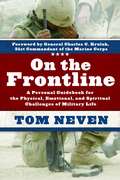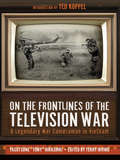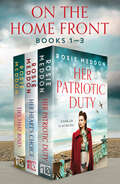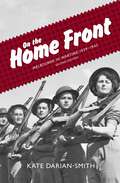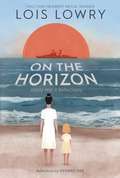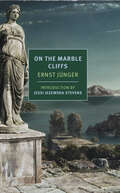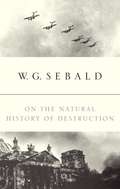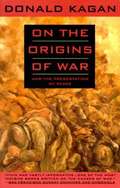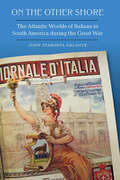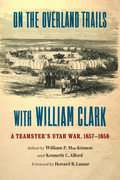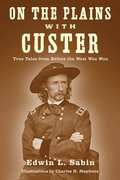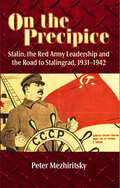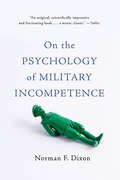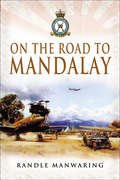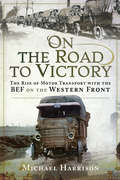- Table View
- List View
On the Bottom: The Raising of the Submarine S-51
by Rear Admiral Edward EllsbergThe man who led the salvage efforts to raise a sunken US Navy submarine recounts the mission in a tale &“that will surely rank among the epics of the sea&” (The Philadelphia Inquirer). The sinking of the submarine S-51 was one of the greatest tragedies in American naval history. Due to a miscommunication and subsequent collision between the sub and a passing steamship on a September night, the S-51, including thirty-three of its crew of thirty-six, sank to the ocean depths. The tragedy of the S-51 captivated the nation, and was a fixture in the pages of American newspapers. The story took on a whole new dimension when the navy decided to take over the salvage of the thousand-ton behemoth from a civilian company. Heading the crew tasked with this impossible feat was Edward Ellsberg, at the time a lieutenant commander. On the Bottom is Ellsberg&’s account of the successes and failures he and his men experienced as they attempted an astonishing feat of engineering and bravery: the first salvage of a submarine from the open ocean.
On the Canal: The Marines of L-3-5 on Guadalcanal, 1942 (Stackpole Military History Series)
by Ore J Marion Thomas Cuddihy Edward CuddihyA gripping true story of the WWII Guadalcanal Campaign—told with no-holds-barred honesty and humor by a Marine who was there. In August of 1942, Allied forces led by U.S. Marines came ashore on Guadalcanal, launching the first major land offensive against Imperial Japan. M. Sgt. Ore J. Marion of L Company, 3rd Battalion, 5th Regiment was among them. Here, Marion and other men of L-3-5 share a personal account of their experiences over the course of this grueling and protracted campaign. The stories contained in these pages are harrowing, profane, heartbreaking, irreverent, and deeply human. As with many personal accounts, some memories recorded here are at odds with the official accounts in Washington&’s archives. Rather than presenting a clean and consistent narrative, On the Canal reflects the messy business of warfare and human memory.
On the Deck or in the Drink: A Naval Aviators Story
by Brian AllenBrian Allen first went to sea as a naval aviation officer cadet aboard HMS Indefatigable in 1952, bound for Gibraltar. In 1954 he was appointed to Lossiemouth for fighter training and flew the Vampire T22. In December 1955 Brian joined 737 Squadron where he was attached to the Anti-Submarine Training Course flying the Fairey Barracuda. On completion he was destined to fly the then new Fairey Gannet twin turbo prop anti-submarine aircraft. July 1955, and now with 825 Squadron, saw his introduction of the new aircraft, a very different machine to the Barracuda. The Squadron joined HMS Albion on 10 January 1956, as she preceded down Channel in the company of her sister ship HMS Centaur, outwards bound for the Far East. After this tour was completed 825 Squadron was disbanded and Brian was transferred to 751 Squadron aboard HMS Warrior, an old WWII carrier with none of the latest facilities of his previous ship and on its final commission. However, his greatest shock was to discover that he would not be flying a Gannet, but the rather elderly Grumman Avenger, a very different airplane with a tail wheel and a piston engine. This would require a great change in take-off and landing technique.In February 1957 Warrior sailed west for the Panama Canal and thence into the Pacific where she and her aircraft would assist in Operation Grapple, the tests of Britain's first atomic bombs. During this operation Brian's adventures included dislodging the padre's kidney stone upon a catapult launch, denting the flight deck by a heavy landing and ditching close to the beach after an engine failure. Having converted to helicopters Brian was posted to 815 Squadron aboard HMS Albion in 1960 flying the Whirlwind Mk 7. During this posting he survived another ditching when his helicopter lost power and sunk. Having returned from a long Far Eastern voyage, Brian was now posted into The Helicopter Trials and Development Unit and it was whilst experimenting in a prototype Wasp that an accident, in which his crewman perished, was to injure him so severely that he was unable to fly again. He completed his commission as an Air Traffic Control Officer
On the Devil's Tail: In Combat with the Waffen-SS on the Eastern Front 1945, and with the French in Indochina 1951–54
by Paul Martelli Vittorino dal CengioA collaborationist who fought for Germany during WWII and later for the French in Vietnam tells his eventful life story in this military memoir. This is the riveting true story of Paul Martelli who fought on the Eastern Front in 1945 as a fifteen-year-old member of the 33rd Waffen-Grenadier-Division of the SS Charlemagne, and later, as a soldier with French forces in the Tonkin area of Vietnam. Paul recounts his time at the Sennheim military training base; his experience of the German invasion of France when he was still a boy in Lorraine; and his motivations for enlisting with the Waffen SS a few years later. He reveals his escapades at Greifenberg, his first love with a German girl helping refugees, and his experiences of combat. After the German defeat, Martelli ends up delivering a group of female camp prisoners to a Russian officer, then living in disguise among enemy soldiers until he escapes and surrenders to the Americans. After a prison sentence and military service in Morocco, Paul is sent to fight in defense of French bases north of Hanoi, Vietnam. Though he survives three years of fierce combat, he compares his service in the Waffen SS with the inefficiency of the French Expeditionary Force and comes out deeply frustrated. At almost twenty-six, Martelli has fought and lost in two wars, both against the communists. Unemployed, and with the ideals of a &‘Nouvelle Europe&’ in pieces, he briefly joins the French Foreign Legion before choosing another path
On the Edge of Flight: A Lifetime in the Development and Engineering of Aircraft
by Eric William AbsolonThis is the story of Eric William Absolon, a relentlessly enthusiastic Aviation champion, whose lifelong love of aircraft has never wavered throughout his long and varied career. From boyhood fascination to the adult realization of his ambitions, this first-hand account takes in some of the key events of the dynamic period of twentieth century history which the author lived and worked through. Working his way up the ranks of the Gloster Aircraft Company, Absolon was able to see all the component processes of Aircraft production. The insight he provides into the inner workings of this busting center of Twentieth Century Aircraft production is unparalleled in modern accounts. Anyone with a fascination for the secret life of Aircraft is in for a treat here as the author relays his working experiences at the creative hub of the industry. His experiences including involvement with the post-war Drop testing of Meteor aircraft, working closely with these infamous vehicles of war in his role as Chief of Engineering Research, as well as an involvement with the more commercial side of Aviation production, a division within Gloster for which he served as Manager. This narrative charts his career with Gloster as well as a series of other companies who invited Absolon to offer his services. It also relays the story of the implementation and development of his own Aviation production business, Aljac Engineering Ltd. His expertise was highly prized then, and is now applied in the translation of experience into engaging prose, set to appeal to all genre enthusiasts.
On the Edges of Whiteness: Polish Refugees in British Colonial Africa during and after the Second World War
by Jochen LingelbachFrom 1942 to 1950, nearly twenty thousand Poles found refuge from the horrors of war-torn Europe in camps within Britain’s African colonies, including Uganda, Tanganyika, Kenya and Northern and Southern Rhodesia. On the Edges of Whiteness tells their improbable story, tracing the manifold, complex relationships that developed among refugees, their British administrators, and their African neighbors. While intervening in key historical debates across academic disciplines, this book also gives an accessible and memorable account of survival and dramatic cultural dislocation against the backdrop of global conflict.
On the Front Line: True World War I Stories
by Jon E. LewisIn 1930, the editor of Everyman Magazine requested entries for a new anthology of Great War accounts. The result was a revolutionary book unlike any other of the period; for as Malcolm Brown notes in his introduction 'I believe it might fairly be described as a rediscovered classic'. It was the very first collection to reveal the many dimensions of the war through the eyes of the ordinary soldier and offers heart-stopping renditions of the very first gas attack; aerial dogfights above the trenches; the moment of going over the top. Told chronologically, from the first scrambles of 1914, the drudgery of the war of attrition once the trenches had been dug, to the final joy of Armistice.
On the Front Lines of the Cold War: An American Correspondent's Journal from the Chinese Civil War to the Cuban Missile Crisis and Vietnam (From Our Own Correspondent)
by Seymour ToppingIn the years following World War II, the United States suffered its most severe military and diplomatic reverses in Asia while Mao Zedong laid the foundation for the emergence of China as a major economic and military world power. As a correspondent for the International News Service, the Associated Press, and later for the New York Times, Seymour Topping documented on the ground the tumultuous events during the Chinese Civil War, the French Indochina War, and the American retreat from Vietnam, Cambodia, and Laos. In this riveting narrative, Topping chronicles his extraordinary experiences covering the East-West struggle in Asia and Eastern Europe from 1946 into the 1980s, taking us beyond conventional historical accounts to provide a fresh, first-hand perspective on American triumphs and defeats during the Cold War era.At the close of World War II, Topping -- who had served as an infantry officer in the Pacific -- reported for the International News Service from Beijing and Mao's Yenan stronghold before joining the Associated Press in Nanking, Chiang Kai-shek's capital. He covered the Chinese Civil War for the next three years, often interviewing Nationalist and Communist commanders in combat zones. Crossing Nationalist lines, Topping was captured by Communist guerrillas and tramped for days over battlefields to reach the People's Liberation Army as it advanced on Nanking. The sole correspondent on the battlefield during the decisive Battle of the Huai-Hai, which sealed Mao's victory, Topping later scored a world-wide exclusive as the first journalist to report the fall of the capital. In 1950, Topping opened the Associated Press bureau in Saigon, becoming the first American correspondent in Vietnam. In 1951, John F. Kennedy, then a young congressman on a fact-finding visit to Saigon, sought out Topping for a briefing. Assignments in London and West Berlin followed, then Moscow and Hong Kong for the New York Times. During those years Topping reported on the Chinese intervention in the Korean conflict, Mao's Cultural Revolution and its preceding internal power struggle, the Chinese leader's monumental ideological split with Nikita Khrushchev, the French Indochina War, America's Vietnam War, and the genocides in Cambodia and Indonesia. He stood in the Kremlin with a vodka-tilting Khrushchev on the night the Cuban missile crisis ended and interviewed Fidel Castro in Havana on its aftermath.Throughout this captivating chronicle, Topping also relates the story of his marriage to Audrey Ronning, a world-renowned photojournalist and writer and daughter of the Canadian ambassador to China. As the couple traveled from post to post reporting on some of the biggest stories of the century in Asia and Eastern Europe, they raised five daughters. In an epilogue, Topping cites lessons to be learned from the Asia wars which could serve as useful guides for American policymakers in dealing with present-day conflicts in Afghanistan and Iraq.From China to Indochina, Burma to Korea and beyond, Topping did more than report the news; he became involved in international diplomacy, enabling him to gain extraordinary insights. In On the Front Lines of the Cold War, Topping shares these insights, providing an invaluable eyewitness account of some of the pivotal moments in modern history.
On the Frontline: A Personal Guidebook for the Physical, Emotional, and Spiritual Challenges of Military Life
by Tom NevenWinning strategies for the battles you face every day. The demands of military life can be staggering. Soldiers, sailors, airmen, and Marines face pressures and temptations that civilians will never know. Fortunately, here is help from someone who has been there. Tom Neven uses examples from history, real-life anecdotes from men and women in uniform, and biblical wisdom to help you navigate the biggest challenges of military life. On the Frontline addresses issues such as: ·Loneliness (how to cope with deployment and separation from family and friends) ·Sex (how to resist temptation and remain faithful) ·Debt (how to manage money and avoid financial traps) ·Relationships (how to build and maintain a marriage, friendships, and other relationships from a distance) ·Fear (how to deal with the threat of injury or death). Written for both men and women, this powerful book confronts these and other issues head-on, offering hope, encouragement, and practical guidance for every day you serve On the Frontline.
On the Frontlines of the Television War: A Legendary War Cameraman in Vietnam
by Yasutsune Hirashiki&“The eyewitness accounts of the many phases of the war in this memoir bring events to life as if they had happened yesterday&” (Vietnam Veterans of America Book Reviews). On the Frontlines of the Television War is the story of Yasutsune &“Tony&” Hirashiki&’s ten years in Vietnam—beginning when he arrived in 1966 as a young freelancer with a 16mm camera, but without a job or the slightest grasp of English, and ending in the hectic fall of Saigon in 1975, when he was literally thrown on one of the last flights out. His memoir has all the exciting tales of peril, hardship, and close calls of the best battle memoirs, but it is primarily a story of very real and yet remarkable people: the soldiers who fought, bled, and died, and the reporters and photographers who went right to the frontlines to record their stories and memorialize their sacrifice. If this was truly the first &“television war,&” then it is time to hear the story of the cameramen who shot the pictures and the reporters who wrote the stories that the average American witnessed daily in their living rooms. An award-winning sensation when it was released in Japan in 2008, this book has been completely recreated for an international audience. &“Tony Hirashiki is an essential piece of the foundation on which ABC was built . . . Tony reported the news with his camera and in doing so, he brought the truth about the important events of our day to millions of Americans.&” —David Westin, former President of ABC News
On the Home Front
by Rosie MeddonLose yourself in these compelling historical sagas full of romance and mystery. Includes all three books in the On the Home Front series; Her Patriotic Duty, Her Heart’s Choice and Ties That Bind.Her Patriotic Duty: Happily in love, Esme Colborne is about to marry Richard Trevannion, descendant of one of the oldest families in England. But when Esme learns she is adopted – from a working class family – she cannot allow Richard to marry so far beneath his station. Fleeing the life she knew, a chance encounter leads Esme to work as a ‘decoy woman’, testing British undercover operatives who may otherwise reveal secrets in a moment of weakness. As dangerous as it is thrilling, she is soon captivated by this world of subterfuge – one wrong move, however, and Esme could lose everything. With her feelings for Richard as strong as ever, should she go back to him and reveal the truth of her birth?Her Heart's Choice: Lou Channer yearns to contribute to the war effort and leave behind North Devon, the only place she’s ever known. She takes a job as a clerk in the Royal Canadian Naval Yard in Plymouth, lodging with other girls from the depot who take her under their wing. When she catches the eye of local wheeler-dealer Harry, who dazzles her with nights about town, she finally feels like one of the girls. And when Lieutenant Douglas Ross asks her out, Lou she can’t believe her luck – or decide to whom to give her heart. But during war, tragedy is only ever just around the corner, and soon, her whole future is on the line…Ties That Bind: After a bomb destroys Esme’s London home, killing her son instantly, she moves to her old country house in Devon to begin the impossible task of recuperating. Soon she is drawn back into the world of espionage, and as her marriage starts to crumble, a local airman pulls her closer. Meanwhile her cousin Lou is awaiting confirmation that she can relocate to Canada to be with her husband. Biding her time back home, she notices her father behaving strangely and disappearing at odd hours to wander the nearby cliffs. With rumours of spies afoot, she needs to learn the truth before anyone else does. Lou and Esme will have more battles to overcome as the war continues…A stunning Second World War saga series of love, self-discovery and heartbreak, perfect for fans of Liz Trenow, Annie Murray and Rosie Archer.Praise for Rosie Meddon‘This was such a beautiful yet emotional story, and I really and truly felt for each and every character, I welled up with tears at times. I really struggled to put the book down.’ *****Reader review'If you love family saga and wartime books you will definitely love this.' *****Reader review‘Really enjoyed this from start to finish. The storyline is brilliant and the characters come alive throughout this book. One I couldn't put down, hope you enjoy it as much as I have.’ *****Reader review‘A totally mesmerising journey. I have loved every page… beautifully written, with amazing characters that you just love.’*****Reader review
On the Home Front: Melbourne in Wartime: 1939—1945
by Kate Darian-SmithWhat really happened on the Australian home front during the Second World War?For the people of Melbourne these were years of social dislocation and increased government interference in all aspects of daily life. On the Home Front is the story of their work, leisure, relationships and their fears—for by 1942 the city was pitted with air raid trenches, and in the half-light of the brownout Melburnians awaited a Japanese invasion.As women left the home to replace men in factories and offices, the traditional roles of mothers and wives were challenged. The presence of thousands of American soldiers in Melbourne raised new questions about Australian nationalism and identity, and the 'carnival spirit' of many on the home front created anxiety about the issues of drunkenness, gambling and sexuality.Kate Darian-Smith's classic and evocative study of Melbourne in wartime draws upon the memories of men and women who lived through those turbulent years when society grappled with the tensions between a restrictive government and new opportunities for social and sexual freedoms.
On the Horizon
by Lois LowryFrom two-time Newbery medalist and living legend Lois Lowry comes a moving account of the lives lost in two of WWII&’s most infamous events: Pearl Harbor and Hiroshima. With evocative black-and-white illustrations by SCBWI Golden Kite Award winner Kenard Pak. Lois Lowry looks back at history through a personal lens as she draws from her own memories as a child in Hawaii and Japan, as well as from historical research, in this stunning work in verse for young readers.On the Horizon tells the story of people whose lives were lost or forever altered by the twin tragedies of Pearl Harbor and Hiroshima. Based on the lives of soldiers at Pearl Harbor and civilians in Hiroshima, On the Horizon contemplates humanity and war through verse that sings with pain, truth, and the importance of bridging cultural divides. This masterful work emphasizes empathy and understanding in search of commonality and friendship, vital lessons for students as well as citizens of today&’s world. Kenard Pak&’s stunning illustrations depict real-life people, places, and events, making for an incredibly vivid return to our collective past. In turns haunting, heartbreaking, and uplifting, On the Horizon will remind readers of the horrors and heroism in our past, as well as offer hope for our future.
On the Hunt
by David HuntSo says Fox News military analyst Colonel David Hunt in a book that cuts like a buzz saw through the half-measures and half-truths, the dangerous timidity, and the outright stupidity that--if left unchecked--will lead America to lose the War on Terror. In the hard-hitting On the Hunt, Colonel Hunt draws on his twenty-nine years of active military service and his high-level military and intelligence contacts to give an inside perspective on this global struggle, setting him far apart from the usual pundits and talking heads. Here he presents fifty pages of previously unpublished documents that reveal the chillingly detailed plans of the terrorists and insurgents who target Americans, as well as U.S. tactics to stop our enemies.From the Department of Homeland Security ("Get rid of it. Scrap it.") to military leaders who have almost zero combat experience to risk-averse, politically correct strategic decision-making, Colonel Hunt pinpoints dire problems that need to be fixed before it's too late (which it nearly is). Offering real solutions that most politicians and pundits are too timid to talk about, On the Hunt lays out specific steps to:* Win the war in Iraq by changing the way we fight--by taking the gloves off and, in doing so, honoring the sacrifices our soldiers are making* Deal with Iran, North Korea, and other dangerous threats * Solve the illegal immigration crisis and keep America's enemies from breaching our borders (both of them)* Make our towns and cities more secure--not by looking to the federal bureaucracy but by taking responsibility ourselves* Protect the liberties of American citizens at home* Ensure that our soldiers are trained and equipped to fight today's and tomorrow's warsAs Colonel Hunt's millions of viewers on Fox News and all the readers of his bestselling book They Just Don't Get It will expect, he pulls no punches while incisively analyzing a war unlike any other. In On the Hunt, Colonel Hunt reveals exactly how high the stakes really are in the War on Terror. He condemns failed policies and the people who made them (and, yes, he names names). And most important, he clearly identifies the strategies, tactics, and qualities of leadership that we must bring to bear to ensure the survival of the proud and free nation we love.From the Hardcover edition.
On the Marble Cliffs
by Ernst JüngerNow in a new translation, an imaginative, darkly radiant fable about a pair of brothers, formerly warriors, whose idyll is shattered by an enroaching fascistic force.Set in a world of its own, Ernst Jünger&’s On the Marble Cliffs is both a mesmerizing work of fantasy and an allegory of the advent of fascism. The narrator of the book and his brother, Otho, live in an ancient house carved out of the great marble cliffs that overlook the Marina, a great and beautiful lake that is surrounded by a peaceable land of ancient cities and temples and flourishing vineyards. To the north of the cliffs are the grasslands of the Campagna, occupied by herders. North of that, the great forest begins. There the brutal Head Forester rules, abetted by the warrior bands of the Mauretanians. The brothers have seen all too much of war. Their youth was consumed in fighting. Now they have resolved to live quietly, studying botany, adding to their herbarium, consulting the books in their library, involving themselves in the timeless pursuit of knowledge. However, rumors of dark deeds begin to reach them in their sanctuary. Agents of the Head Forester are infiltrating the peaceful provinces he views with contempt, while peace itself, it seems, may only be a mask for heedlessness. Tess Lewis&’s new translation of Jünger&’s sinister fable of 1939 brings out all of this legendary book&’s dark luster.
On the Natural History of Destruction
by W. G. SebaldW.G. Sebald completed this extraordinary and important -- and already controversial -- book before his untimely death in December 2001. On the Natural History of Destruction is W.G. Sebald's harrowing and precise investigation of one of the least examined "silences" of our time. In it, the acclaimed novelist examines the devastation of German cities by Allied bombardment, and the reasons for the astonishing absence of this unprecedented trauma from German history and culture. This void in history is in part a repression of things -- such as the death by fire of the city of Hamburg at the hands of the RAF -- too terrible to bear. But rather than record the crises about them, writers sought to retrospectively justify their actions under the Nazis. For Sebald, this is an example of deliberate cultural amnesia; his analysis of its effects in and outside Germany has already provoked angry and painful debate. Sebald's incomparable novels are rooted in meticulous observation; his essays are novelistic. They include his childhood recollections of the war that spurred his horror at the collective amnesia around him. There are moments of black humour and, throughout, the unmatched sensitivity of Sebald's intelligence. This book is a vital study of suffering and forgetting, of the morality hidden in artistic decisions, and of both compromised and genuine heroics.
On the Origins of War
by Donald KaganBy lucidly revealing the common threads that connect the ancient confrontations between Athens and Sparta and between Rome and Carthage with the two calamitous world wars of the 20th century and the Cuban Missile Crisis, Kagan reveals new insights into the nature of war and peace that are vitally important and often surprising.
On the Other Shore: The Atlantic Worlds of Italians in South America during the Great War
by John Starosta GalanteOn the Other Shore explores the social history of Italian communities in South America and the transnational networks in which they were situated during and after World War I. From 1915 to 1921 Italy&’s conflict against Austria-Hungary and its aftermath shook Italian immigrants and their children in the metropolitan areas of Buenos Aires, Montevideo, and São Paulo. The war led portions of these communities to mobilize resources—patriotic support, young men who could enlist in the Italian army, goods like wool from Argentina and limes from Brazil, and lots of money—to support Italy in the face of &“total war.&” Yet other portions of these communities simultaneously organized a strident movement against the war, inspired especially by anarchism and revolutionary socialism. Both of these factions sought to extend their influence and ambitions into the immediate postwar period.On the Other Shore demonstrates patterns of social cohesion and division within the Italian communities of South America; reconstructs varying transatlantic and inter-American networks of interaction, exchange, and mobility in an &“Italian Atlantic&”; interrogates how authorities in Italy viewed their South American &“colonies&”; and uncovers ways that Italians in Latin America balanced and blended relationships and loyalties to their countries of residence and origin. On the Other Shore&’s position at the intersection of Latin American history, Atlantic history, and the histories of World War I and Italian immigration thereby engages with and informs each of these subject areas in distinctive ways.
On the Other Side -- To My Children: From Germany 1940-1945
by Mathilde Wolff-Mönckeberg Ruth EvansIn October 1940 Mathilde Wolff-Mönckeberg wrote the first of a series of letters to her children. It was never sent. She was in Hamburg and they were far away, 'on the other side', in Wales, the USA and Denmark. Nevertheless she continued to write throughout the war, and these 'diary-letters' grew into a remarkable journal describing daily life under almost constant bombing, the author's hopes and fears, the progress of the war she hated. Not expecting to survive, this journal was her testament to her children and grandchildren. She did survive, however, and the manuscript was put aside; it was discovered nearly thirty years later by her daughter, Ruth Evans. On the Other Side is a human document of great historical interest: an account by a cultured, liberal, anti-Nazi woman of the day-to-day destruction of a city and its people. Firmly rooted in Hamburg--her father had been Lord Mayor, her husband, Emil Wolff, was a distinguished professor at the University--and yet cosmopolitan in outlook, with strong cultural and family ties with 'the enemy', Mathilde Wolff-Mönckeberg offers a unique perspective. Her letters give a harrowing description of civilian life under the incessant bombardment of total war. We also experience the propagandist reporting of the war from the German press and public announcements, and the civilian reaction to the ebb and flow of the tide leading up to the final invasion of Germany's frontiers. We share her anxieties for her children, her sorrow as those close to her die, and most poignantly, her bewilderment as the city she loves is annihilated by a people--the English--she has always respected and admired. However, what remains in the reader's mind are the inspired human qualities of the author--her courage as she is forced continually to re-examine her ideals and convictions. her unshakeable belief in justice and man's humanity, and her wisdom and compassion which illuminate every page of these letters to her 'beloved, far-away children'.
On the Overland Trails with William Clark: A Teamster's Utah War, 1857–1858
by William P. MacKinnon Kenneth L. AlfordThe Utah War remains an understudied but important moment in western history as the United States wrestled with its political future. There are few primary accounts from this war, but one of the best comes from William Clark, a young teamster hired by Russell, Majors and Waddell, the West&’s greatest freighters. Clark&’s narrative, &“A Trip Across the Plains in 1857,&” was not published until 1922 and only then in an obscure journal with little annotation, so for the last hundred years, this work has been a valuable but obscure document. In On the Overland Trails with William Clark William P. MacKinnon and Kenneth L. Alford have remedied this historiographical oversight by providing material entirely missing from the original printing, including an explanation of the Utah War&’s origins and prosecution; maps by which to chart Clark&’s travels; illustrations to enliven major players; and annotations to clarify the sometimes arcane people, places, incidents, and issues mentioned. Also included for the first time is an account of the manuscript&’s colorful provenance.
On the Plains with Custer: Tales from Before the West Was Won
by Edwin L. Sabin Charles H. StephensThis historical western was written before Custer was known as General, a time when those who knew and marched with Custer were still alive. Edwin L. Sabin tells the story of a man who was “as great in peace as in war” from the perspective of Ned Fletcher, a bugler who served under the general. From the westward expansion of Northern Pacific Railway, to Custer’s encounters with Sitting Bull and the famous Battle of the Little Bighorn, this account of Custer’s adventures is told in an engaging manner and is based upon extensive research. Sabin muses on what really happened at the Battle of Little Bighorn and weaves us a tale that seamlessly combines entertaining storytelling with factual accuracy.While there were no survivors from Custer’s Last Stand (or Battle of the Greasy Grass, as it is referred to by Native Americans), the author was able to piece out this quintessential American story from records, Mrs. Custer’s writings, and news articles from that time. With the help of the dutiful young soldier, Ned Fletcher, this story embodies what Sabin is best known for—western tales that imbue lessons in good and evil.
On the Precipice: Stalin, the Red Army Leadership and the Road to Stalingrad, 1931–1942
by Peter MezhiritskyNominated for the 2013 PushkinHouse/Waterstone's Russian Book Prize. Like some astronomers, who discover cosmic objects not by direct observation, but by watching the deviations of known heavenly bodies from their calculated trajectories, Peter Mezhiritsky makes his findings in history through thoughtful reading and the comparison of historical sources. This book, a unique blend of prosaic literature and shrewd historic analysis, is dedicated to events in Soviet history in light of Marshal Zhukov's memoirs. Exhaustive knowledge of Soviet life, politics and censorship, including the phraseology in which Communist statesmen were allowed to narrate their biographical events, gave Peter Mezhiritsky sharp tools for the analysis of the Marshal's memoirs. The reader will learn about the abundance of awkward events that strangely and fortuitously occurred in good time for Stalin's rise to power, about the hidden connection between the purges, the Munich appeasement and the German occupation of Czechoslovakia, and about the real reason why it took so long to liquidate Paulus' Sixth Army at Stalingrad. The author presents a clear picture of the purges which promoted incompetent and poorly educated commanders (whose most prominent feature was their personal dedication to Stalin) to higher levels of command, leaving the Soviet Union poorly prepared for a war against the Wehrmacht military machine. The author offers alternative explanations for many prewar and wartime events. He was the first in Russia to acknowledge a German component to Zhukov's military education. The second part of the book is dedicated to the course of the Great Patriotic War, much of which is still little known to the vast majority of Western readers. While not fully justifying Zhukov's actions, the author also reveals the main reason for the bloody strategy chosen by Zhukov and the General Staff in the defensive period of the War. In general, the author shares and argues Marshal Vasilevsky's conviction - if there had been no purges, the war would not have occurred. The book became widely known to the Russian-reading public on both sides of the Atlantic, and in the last ten years its quotations have been used as an essential argument in almost all the debates about the WWII. The book is equally intended for scholars and regular readers, who are interested in Twentieth Century history.
On the Psychology of Military Incompetence
by Norman F. DixonThe Crimea, the Boer War, the Somme, Tobruk, Pearl Harbor, the Bay of Pigs: these are just some of the milestones in a century and a half of military incompetence, of costly mishaps and tragic blunders. Are these simple accidents-as the "bloody fool” theory has it-or are they inevitable?The psychologist Norman Dixon argues that there is a pattern to inept generalship, a pattern he locates within the very act of creating armies in the first place, which in his view produces a levelling down of human capability that encourages the mediocre and limits the gifted. A classic study of military leadership, On the Psychology of Military Incompetence is both an original exploration of infamous modern battles and an essential guide for the next generation of military leaders.
On the Road to Mandalay
by Randle Manwaring"The fascinating book features the life story of Dr Randle Manwaring,focusing particularly on his Regiment's fight to capture Burma towards the end of WW2As one of the founding Officers of the RAF Regiment, the author helped train and set up the Regiment from its inception in 1942.He saw active service with the Regiment in Burma, where the Regiment particularly distinguished itself but suffered heavy losses. Randle was present at the Japanese surrender in Rangoon and took the Swords from the Japanese Generals as they surrendered.The end of the War saw a return to a very different life requiring different skills. Guided by his strong Christian beliefs, Randle established a successful career in the City in Insurance Broking."
On the Road to Victory: The Rise of Motor Transport with the BEF on the Western Front
by Michael HarrisonThe story of a revolution in moving troops and supplies: “A rare gem that will fill a gap in your World War I library. Highly recommended.” —Indy Squadron Dispatch The Great War produced many innovations, in particular the spectacular development by the British and French armies of motor transport.The age-old problem of moving soldiers and their supplies was no different in 1914 than it had been some 2,400 years ago, when the great Chinese military thinker Sun Tzu informed his readers that the further an army marched into enemy territory, the more the cost of transport increased, even to the point that more supplies were consumed by the transportation of men and their horses than was delivered to the troops.Using many previously unpublished illustrations, including artists’ impressions, this book tells the story of the men and women who made motor transport work for the victorious British Army on the Western Front, so that in 1918, the humble lorry did indeed help propel the British Army forward on the road to victory.
